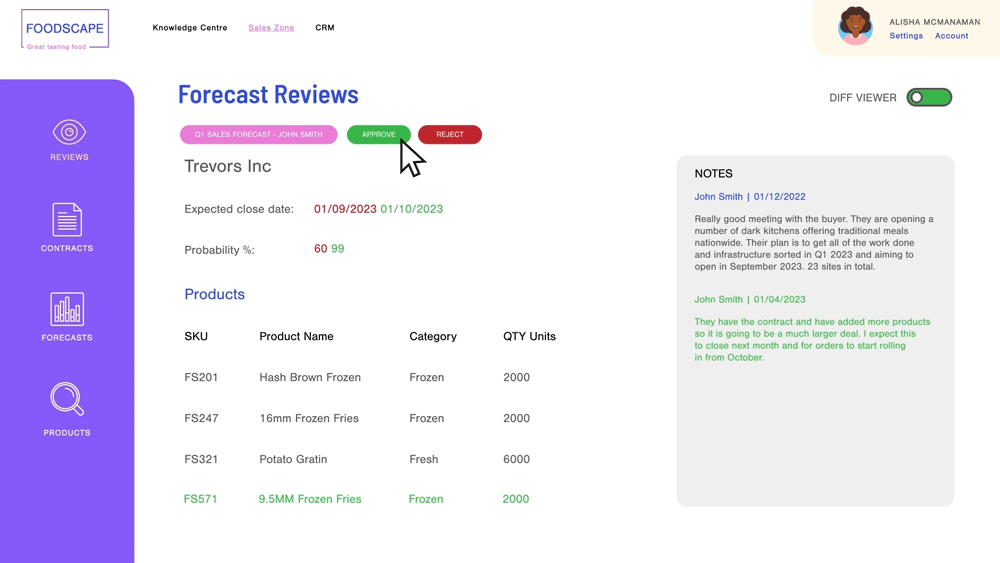In today’s fast-paced and competitive business landscape, it is critical to have a robust system for data and content moderation. TerminusCMS, a content management system designed for large organizations, offers a key feature that sets it apart from other solutions: change request workflows at the data layer. In this article, we will explore why this feature is essential for critical business processes, such as forecasting, product testing, and documentation compliance.
Change request workflows allow users to submit requests to modify data or content within the system. These requests can range from minor changes, such as correcting a typo, to major updates, such as adding new features or removing outdated information. The approval process ensures that all changes are reviewed and approved by designated stakeholders before they are implemented. This feature offers several benefits that are especially important for critical business processes.
How we handle content moderation at the data layer
TerminusCMS is built upon our document graph database TerminusDB and benefits from its features. It uses a combination of immutable data, succinct data structures, and delta encoding to provide collaboration and version control features similar to Git. This means the database that stores your content and data can be cloned, branched, merged, and conflict-checked. It also provides a complete history of every document along with who changed it and when, with the ability to compare versions, time travel, and roll back. Everything you need for content moderation and change request workflows.
CMS for business-critical functions and the importance of data and content moderation
First and foremost, change request workflows with approvals help maintain data and content accuracy. In forecasting, for example, accurate data is critical for making informed decisions. Forecasts in the manufacturing sector for instance have direct impacts on production and supply chain planning and costs so need to be bomb-proof. Without a proper system in place to review and approve changes, inaccuracies can quickly creep into the system, leading to incorrect forecasts and potentially costly mistakes. By requiring approvals for changes, TerminusCMS ensures that all modifications are thoroughly reviewed and vetted before being implemented, reducing the risk of errors and inaccuracies.

Another key benefit of change request workflows is that they help maintain accountability and transparency. In product testing, for example, it is important to be able to trace all changes made to the system to identify potential issues or errors. With TerminusCMS, all changes are tracked and recorded, providing a clear audit trail of who made what changes and when. This level of accountability ensures that all stakeholders are aware of any modifications made to the product testing data and can take appropriate action if necessary.
Content moderation and change request workflows are also crucial for maintaining regulatory-compliant documentation. In industries such as healthcare, finance, and software, compliance with regulations and standards is essential. TerminusCMS’s approval process ensures that all changes made to documentation are compliant with relevant regulations and standards, reducing the risk of non-compliance and potential penalties. By maintaining a complete audit trail of all changes, TerminusCMS helps organizations demonstrate compliance to auditors and regulators, providing additional peace of mind and ensuring that the organization remains in good standing.
Why do I care that collaboration is in the database layer?
There are a number of reasons why you should care that content moderation and more broadly collaboration is incorporated into the database. These include –
- Hard-driven rules – A CMS will power a range of front-ends and applying a standardized rules-driven approach maintains a high level of control across systems that are often in different areas of the organization and as such hard to govern.
- Dev-focused – Devs are going to do the hard work and build your applications. Providing collaboration features for backend and frontend developers to take advantage of will make better use of their (limited) time and enable them to work faster.
- Machine-readable – Storing document histories and detailing who changed what and when provides opportunities to make use of machine-assisted analytics and gives devs the query power to search past and present.
- Business focused – An obvious point, but one worth stating, better accuracy, accountability, and transparency are key to business performance.
Ready to improve your organization’s data and content management with TerminusCMS? Our content moderation and change request workflows feature help ensure accuracy, accountability, and regulatory compliance in critical business functions. Get in touch if you’d like a demo, or sign up to TerminusCMS, clone a demo project and have a play.
